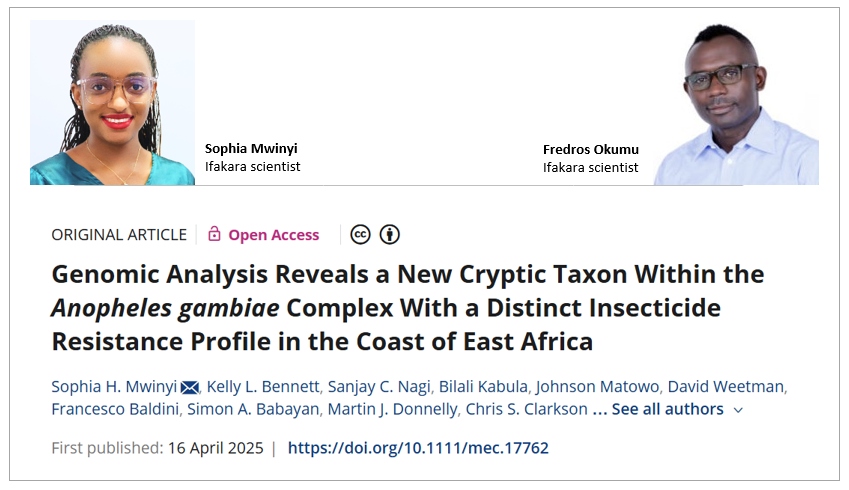
DISCOVERY: New mosquito species with unique resistance profile found in Tanzania’s coast

Scientists at the Ifakara Health Institute in Tanzania and two partners – the University of Glasgow and the Wellcome Sanger Institute, UK – have uncovered a previously unknown mosquito group within the anopheles gambiae complex which is a major malaria vector.
Named the pwani molecular form, this distinct taxon is found only along Tanzania’s coast and shows a unique genetic makeup and insecticide resistance profile, according to a study published on April 16, 2025, in Molecular Ecology.
This study – led by Ifakara Health Institute’s early-career researcher Sophia Mwinyi and supervised by seasoned mosquito ecology researcher at Ifakara and Vector Biology professor at the University of Glasgow Dr. Fredros Okumu – analyzed whole-genome sequences of 300 mosquitoes collected between 2012 and 2015 across four northern Tanzanian regions.
The team, including Dr. Alistair Miles from the Wellcome Sanger Institute and contributions from the Liverpool School of Tropical Medicine, UK; the National Institute for Medical Research (NIMR), Tanzania; and the Kilimanjaro Christian Medical University College (KCMUCo), Tanzania – identified three taxa: an. gambiae s.s., an. arabiensis, and the newly discovered pwani form.
Pwani lacks common resistance markers
Unlike other taxa, the scientists say, the pwani form lacks common insecticide resistance markers, such as target-site mutations and copy number variations, making it uniquely susceptible to current insecticides.
The study also revealed geographical differences in an. gambiae s.s. populations. Mosquitoes from Muleba in the northwest showed higher resistance to pyrethroids compared to those from Muheza in the northeast, indicating isolated subpopulations. In contrast, an. arabiensis showed no regional differences, suggesting widespread gene flow.
Why this discovery matters?
This discovery highlights the importance of genetic data in malaria control. Understanding these variations could guide targeted interventions, improving efforts to combat malaria in East Africa.
Lead author Sophia Mwinyi said: “The discovery of the pwani molecular form reveals gaps in our understanding of mosquito diversity in malaria-endemic areas. Its distinct insecticide profile and restricted geographical presence suggests that this mosquito species possibly plays a potential role in sustaining malaria transmission during the dry season, when other vectors are less active in these respective areas. This could also explain the continued persistent cases of malaria in these locations despite widespread use of bed nets”.
While the implications of this discovery remain to be fully understood, these findings suggest that current control approaches may likely not be able to effectively target the newly discovered pwani mosquito.
Dr. Fredros Okumu, said: “By using genetics, we can help stay ahead of the game in the fight against malaria. Understanding the DNA of mosquito populations helps scientists and public health officials design better interventions to stop disease transmission.”
Alistair Miles, said: “Genomic analysis reveals a new cryptic taxon of malaria vectors with a distinct insecticide resistance profile in the coast of East Africa. [it] calls for urgent entomological and epidemiological investigations to determine the behaviour, ecology, and vector potential of the pwani molecular form.
Three funding partners involved
The study was funded by the Wellcome Trust, the Bill & Melinda Gates Foundation and UK Medical Research Council.
Read the publication here.
